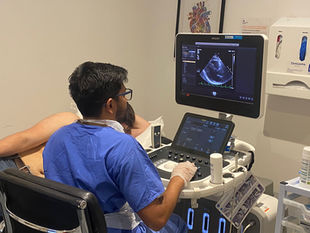
So what can Cardiolgoists actually do?
If you've been referred to a cardiologist, or you're researching heart specialists for yourself or a loved one, you might be wondering—what exactly can cardiologists do?
Cardiologists are medical doctors who specialise in diagnosing, treating, and managing conditions that affect the heart and circulatory system. Their role goes far beyond simply identifying problems—they work to prevent disease, manage long-term conditions, and improve quality of life for people at every stage of heart health.
In this blog, I’ll break down what cardiologists do, what kind of tests and treatments they provide, and when you might need to see one.
What Is a Cardiologist?
A cardiologist is a doctor who has undergone additional specialist training after medical school and foundation years, focusing on the diagnosis and treatment of cardiovascular disease. They often work in hospitals, heart clinics, and community health settings and may treat both acute conditions—such as heart attacks—and chronic illnesses like high blood pressure or heart failure.
Our consultant cardiologists are based in Surrey and have extensive NHS and academic experience, with special interests ranging from arrhythmias and valve disease to heart failure and coronary artery disease.
What Conditions Do Cardiologists Treat?
Cardiologists manage a wide range of heart-related conditions, including:
Angina �– chest pain due to restricted blood flow to the heart
Arrhythmias – irregular heart rhythms such as atrial fibrillation
Coronary artery disease – narrowing of the arteries supplying the heart
Heart attacks – urgent treatment and post-recovery care
Heart failure – where the heart is too weak or stiff to pump effectively
Heart valve disease – such as aortic stenosis or mitral regurgitation
Congenital heart conditions – structural issues present from birth
High blood pressure (hypertension) – a major risk factor for stroke and heart disease
Raised cholesterol and lipid disorders
Pericardial conditions – such as fluid around the heart
Cardiologists also manage cardiovascular risk in people who haven't yet developed disease but have warning signs like elevated cholesterol, diabetes, or a family history of heart disease.
What Tests Do Cardiologists Perform?
To understand how your heart is working, a cardiologist may recommend a number of diagnostic tests. These help guide diagnosis and determine whether treatment is needed.
Common cardiology tests include:
Blood tests – for cholesterol, glucose, cardiac enzymes, and kidney function
12-lead ECG – a simple tracing of your heart’s electrical activity
24-hour or 7-day ECG monitoring – for intermittent palpitations or arrhythmias
Blood pressure monitoring – often done over 24 hours to detect masked or white-coat hypertension
Echocardiogram – an ultrasound scan that shows how the heart is pumping and whether valves are working correctly
Stress tests – to evaluate how the heart performs under physical stress
CT coronary angiograms – detailed imaging to detect narrowing or blockages in the heart’s arteries
At Heartsure, we offer all of these tests from our Surrey clinic, with fast access and consultant-led interpretation. You can read more about our services here.
What Treatments Do Cardiologists Offer?
Once a diagnosis is made, a cardiologist will create a tailored treatment plan. This may include:
1. Lifestyle and Prevention Guidance
Dietary changes, exercise plans, and smoking cessation
Reducing alcohol intake and managing stress
Weight management and blood pressure control
2. Medication
Statins to reduce cholesterol
Beta-blockers, ACE inhibitors, or diuretics for heart failure
Anticoagulants for atrial fibrillation or clot prevention
Anti-anginal medication to reduce chest pain
3. Procedures and Interventions
Some cardiologists, known as interventional cardiologists, are trained to carry out procedures such as:
Angioplasty and stent placement for blocked arteries
Pacemaker or defibrillator implantation
Cardiac ablation for treating certain arrhythmias
Cardioversion – resetting abnormal heart rhythms
Although more complex procedures like heart bypass surgery are carried out by cardiac surgeons, your cardiologist will coordinate the referral and aftercare.
When Should You See a Cardiologist?
You may be referred to a cardiologist by your GP, or you might choose to see one privately if you're experiencing symptoms or want a full cardiac health check.
Reasons to see a cardiologist include:
Chest pain or discomfort
Shortness of breath, especially with exertion
Palpitations or irregular heartbeat
High blood pressure that’s hard to control
A family history of heart disease or sudden cardiac death
History of stroke, diabetes or high cholesterol
Need for pre-operative heart clearance
Even if you feel well, seeing a cardiologist can be beneficial if you have multiple risk factors. Early intervention helps prevent serious events like heart attacks or stroke.
How Do Cardiologists Work With Other Healthcare Professionals?
Cardiologists often work as part of a wider team, which may include:
GPs – who refer patients and manage chronic conditions alongside cardiology care
Specialist cardiac nurses – who support with rehabilitation, medication titration and lifestyle advice
Physiologists and radiographers – who perform ECGs, echocardiograms and imaging tests
Cardiac surgeons – for patients who need structural procedures such as bypass surgery or valve repair
This multidisciplinary approach ensures patients receive holistic care, tailored to their medical needs and lifestyle.
Why Choose a Private Cardiologist?
Seeing a private cardiologist means faster access to appointments, investigations, and treatment. We offer:
Same-week availability for consultations and diagnostics
A comfortable, private environment
Full cardiac assessments with blood tests, ECG, echocardiograms, and CT imaging
Personalised treatment plans delivered by experienced NHS consultants
If you live in Surrey or the surrounding area and are looking for specialist cardiac care, contact us here to arrange an appointment with one of our cardiologists.
Conclusion
So, what can cardiologists do? In short, they assess, diagnose, treat, and help prevent heart and circulatory conditions that could otherwise have life-altering or life-threatening consequences. Whether you’re seeking reassurance, experiencing symptoms, or managing a known condition, a cardiologist plays a vital role in supporting your heart health at every stage.
We’re proud to offer expert, consultant-led cardiology services from our Surrey clinic, combining advanced diagnostics with compassionate care.






